外婆的家当-麦琪人物英语分析
_外婆的日用家当_中女性人物的象征意义_胡忠青

一艾丽丝・沃克,美国妇女文学和黑人文学的最杰出代表,也是美国文学史上最杰出的作家之一。
其主要作品有《格兰奇・科普兰的第三次生命》,《子午线》,《寻找我们母亲的家园》,《爱与困惑的交织:黑人妇女的故事》等。
其重要的作品是《紫色》,该小说获美国图书界三项大奖———普利策文学图书奖,国家优秀图书奖和全国图书评论奖。
二《日用家当》中主要有三女性。
一是小说的叙述者母亲,母亲没有受过多少教育,吃苦耐劳却有一定的头脑;二是大女儿迪伊,她漂亮、聪敏,受过大学教育;三是小女儿麦姬,她丑陋笨拙、性格懦弱、自卑内向。
两个姐妹在外表、性格和生活经历等方面天壤之别并形成鲜明对照。
故事围绕着几件日用家当展开。
在这篇短篇小说中,沃克使用了象征、对比、隐喻和明喻等修辞手法,揭示了由白人强势文化冲击所造成的黑人心灵文化迷失的现象,生动准确地反映了黑人在强势文化冲击下的不同态度。
所谓“象征”,是指用一个具体的事物形象暗示某种不确定的、抽象的意义。
这本来是文学写作中的一种修辞技巧。
象征主义者把它普遍应用于文学创作中去,从而使它成为一种具有原则性质的创作方法。
象征主义者试图通过一种由含混的隐喻来描述结构复杂的联想,传达独特的个人感受。
它有两个重要的意义:一是用看得见的符号来表示看不见的事物"二是符号和意义之间的联想性和相关性。
象征可以激发读者的联想和想象,增强作品的感染力,引导读者加深对作品的深层次的理解。
而在这篇小说中,作者通过赋予三位女性不同的象征意义,向读者揭示了这样一个主题:美国黑人应该用发自肺腑的真诚来接受和继承非洲文化与非裔美国黑人文化。
(一)迪伊———黑人文化民族主义运动的象征。
20世纪初,新黑人文化运动诞生。
新黑人文化运动利用第一次世界大战后的有利形势,以复兴黑人民间文化遗产、表现种族自我、反对种族歧视和振兴美国黑人文化为主要内容,在保持黑人尊严和个性的前提下以融入美国主流社会为宗旨的文化思想启蒙运动。
在这种背景下,60年代黑人文化民族文化运动应运而生。
大学高级英语学期论文 《外婆的日用家当》迪伊的启示

《外婆的日用家当》迪伊的启示摘要:迪伊是美国著名的黑人女作家艾丽丝·沃克尔在其短篇小说《外婆的日用家当》中塑造的一名年轻的黑人女子形象。
在对待黑人文化遗产这一问题上,她与其母亲及妹妹有着迥异的态度。
迪伊个性鲜明,象征意义深刻。
剖析迪伊,便于对本民族及其遗产树立正确的价值观念。
这不仅是单针对黑人文化遗产来说的,就是对如何继承我们中华文化遗产亦有着积极意义。
关键字:黑人;文化遗产;启示一、作者与创作背景艾丽丝·沃克尔(Alice Walker,1944—)是美国女诗人、小说家及政论家,为20世纪70年代以来美国文坛最著名的黑人女作家之一。
艾丽斯·沃克尔生于南方佐治亚州的贫苦家庭,1961年入斯帕尔曼大学学习,并投身于争取种族平等的政治运动。
毕业后继续参加争取黑人选举权的运动。
其主要作品为小说《紫色》(1982)、小说《格兰奇·科普兰的第三次生命》(1970)、小说集《爱与烦恼:黑人妇女的故事》(1973)和长篇小说《梅丽迪恩》(1976)。
艾丽斯·沃克尔鼓励女性通过争取自由平等的斗争和寻求真正的自我而获得独立和充分的人性。
艾丽斯·沃克尔擅长描写农村妇女,并特别偏重于黑人与黑人之间相互关系的分析刻画。
她在她的小说里生动的反映了黑人女性的苦难,歌颂了她们与逆境搏斗的精神和奋发自立的坚强性格。
《外婆的日用家当》选自小说集《爱与烦恼:黑人妇女的故事》,它的创作背景是二十世纪六十年代到七十年代中期美国风起云涌的黑人民权运动。
这一运动的主旨是反对白人种族隔离和种族歧视。
随着运动的不断深入,政府相继宣布黑人权利的合法性。
同时,黑人文化民族主义也在六十年代应运而生。
大批黑人开始苏醒,开始自己的寻根之旅。
也有很多人开始排斥充满苦痛的美国黑人伤痛文化史,宣扬“黑人最美”。
在当时,很多黑人对于如何给自己定位及如何对待民族文化遗产一度陷入了迷惑。
作者的这篇《外婆的日用家当》便是运用了象征的手法,表达了自己对于黑人民族文化遗产的态度。
高级英语1 lesson4 资料-叛逆者_捍卫者_继承者_解读_外婆的日用家当_中的三位女性
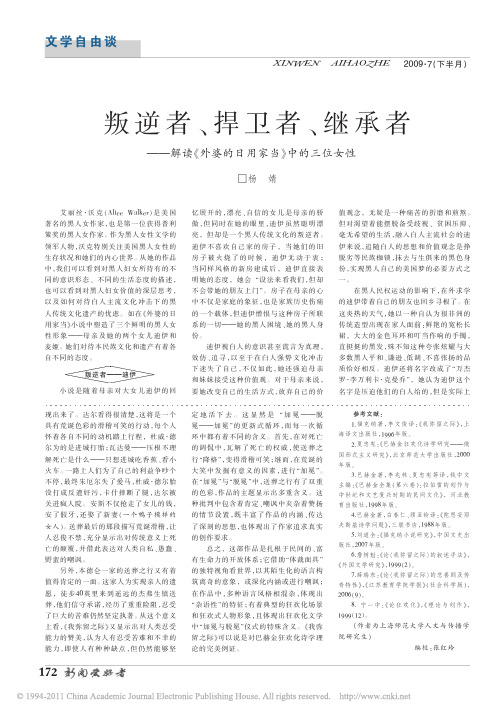
总之, 这部作品是扎根于民间的、富 有生命力的开放体系;它借助“体裁面具” 的独特视角看世界,以其陌生化的语言构 筑离奇的意象, 或深化内涵或进行嘲讽; 在作品中,多种语言风格相混杂,体现出 “杂语性”的特征;有着典型的狂欢化场景 和狂欢式人物形象,且体现出狂欢化文学 中“加冕与脱冕”仪式的特殊含义。 《我弥 留之际》可以说是对巴赫金狂欢化诗学理 论的完美例证。
文学自由谈
XINWEN AIHAOZHE 2009·7(下半月)
叛逆者、捍卫者、继承者
— ——解读《外婆的日用家当》中的三位女性
□杨 婧
艾 丽 丝·沃 克 (Alice Walker) 是 美 国 著名的黑人女作家,也是第一位获得普利 策奖的黑人女作家。 作为黑人女性文学的 领军人物,沃克特别关注美国黑人女性的 生存状况和她们的内心世界。 从她的作品 中,我们可以看到对黑人妇女所持有的不 同的意识形态、 不同的生活态度的描述, 也可以看到对黑人妇女价值的深层思考, 以及如何对待白人主流文化冲击下的黑 人传统文化遗产的忧虑。 如在《外婆的日 用家当》小说中塑造了三个鲜明的黑人女 性 形 象 — ——母 亲 及 她 的 两 个 女 儿 迪 伊 和 麦姬。 她们对待本民族文化和遗产有着各 自不同的态度。
绝望主妇英语解析
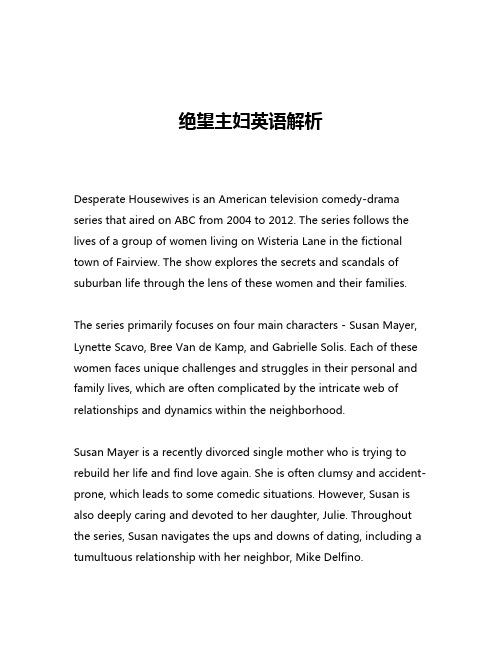
绝望主妇英语解析Desperate Housewives is an American television comedy-drama series that aired on ABC from 2004 to 2012. The series follows the lives of a group of women living on Wisteria Lane in the fictional town of Fairview. The show explores the secrets and scandals of suburban life through the lens of these women and their families.The series primarily focuses on four main characters - Susan Mayer, Lynette Scavo, Bree Van de Kamp, and Gabrielle Solis. Each of these women faces unique challenges and struggles in their personal and family lives, which are often complicated by the intricate web of relationships and dynamics within the neighborhood.Susan Mayer is a recently divorced single mother who is trying to rebuild her life and find love again. She is often clumsy and accident-prone, which leads to some comedic situations. However, Susan is also deeply caring and devoted to her daughter, Julie. Throughout the series, Susan navigates the ups and downs of dating, including a tumultuous relationship with her neighbor, Mike Delfino.Lynette Scavo is a former career woman who has given up her job to become a stay-at-home mother to her four children. She is often overwhelmed by the demands of parenting and struggles to maintain a sense of identity outside of her role as a mother. Lynette's relationship with her husband, Tom, is also tested as they navigate the challenges of balancing work and family life.Bree Van de Kamp is the epitome of the perfect suburban housewife. She is meticulous, organized, and an excellent cook and homemaker. However, Bree's seemingly perfect life is often marred by secrets and scandals, including her husband's infidelity and her own struggles with alcoholism. Bree's quest for perfection often puts her at odds with her family and friends.Gabrielle Solis is a former model who is married to a wealthy businessman, Carlos Solis. Gabrielle is accustomed to a lavish lifestyle and often finds herself bored and dissatisfied with her role as a housewife. She engages in an affair with her teenage gardener, which leads to a series of complications and scandals.Throughout the series, the lives of these four women intersect and overlap, creating a tapestry of complex relationships, secrets, and scandals. The show explores themes of friendship, family, love, and the challenges of navigating the ups and downs of suburban life.One of the key themes of Desperate Housewives is the idea of the "desperate housewife." The series challenges the traditional portrayal of the suburban housewife as a content, fulfilled individual. Instead, it presents a more nuanced and complex picture of the struggles and dissatisfactions that many women face in their roles as homemakers and caregivers.The show also explores the ways in which the societal expectations and pressures placed on women can lead to feelings of isolation, frustration, and a sense of lost identity. The characters in Desperate Housewives often find themselves torn between their roles as wives and mothers and their desires for personal fulfillment and independence.Another important theme in the series is the concept of secrets and lies. Each of the main characters harbors secrets and struggles to maintain a facade of normalcy and perfection. These secrets often come back to haunt them, leading to a series of scandals and crises that threaten to unravel the delicate fabric of their lives.The show also delves into the complexities of relationships, both romantic and familial. The characters navigate the challenges of maintaining healthy relationships in the face of infidelity, betrayal, and the pressures of everyday life. The series explores the ways in which these relationships can both sustain and undermine thecharacters' sense of self and well-being.Desperate Housewives has been praised for its sharp writing, compelling characters, and its ability to blend comedy and drama in a way that resonates with audiences. The series has also been criticized by some for its portrayal of women and its reliance on stereotypes and tropes. However, many viewers and critics have argued that the show ultimately subverts these stereotypes and presents a more nuanced and complex representation of the lives of modern women.Overall, Desperate Housewives is a compelling and engaging television series that explores the complexities of suburban life and the challenges faced by women in their roles as wives, mothers, and individuals. The show's enduring popularity and cultural impact are a testament to its ability to capture the universal experiences and struggles of women in a way that is both entertaining and thought-provoking.。
从身份认同角度分析《外婆的日用家当》

火上烧熟的猪肝” 。 [4]96 这段自述性描写,不仅形 象、具体,而且十分生动,从举止、行动到着装让 我们见到了一个真实典型的美国黑人妇女形 象:身体强壮,意志坚定并具有男子气概。母亲 勤劳、能干,没有受过多少教育,贫穷但是乐观。 她对两个女儿的不同态度象征着美国黑人大众 对民族文化的不同认同。在民族文化认同面前, 她是一个由迷茫转向清醒的黑人。她迷茫是因 为她不知道如何调和与伤痛文化的关系;她清 醒是因为她真正理解了文化和遗产 的含义,并 最终为遗产的归属做了正确的选择。母亲对迪 伊的感情是复杂的。她为迪伊的成功,个人能力 及姣好的外貌而骄傲,但是却反感她的自私。尽 管她看到女儿并非传统非洲的打扮,虽然很刺 眼,她仍然觉得很好看;女儿向她问候,虽然听 不懂,她还是接受了;迪伊改了 名字,母亲 虽然 失望,却也努力学着用新名叫她。所有这些都告 诉我们,母亲对黑人文化民族主义运动虽然一 无所知,却也努力配合并试图去了解她。但是当 发现迪伊自私地要拿走家里的日用家当却不知 道他们的历史和所凝结的情感时,母亲对迪伊 这种抛弃传统的举动彻底失望了。对待麦琪,这 位伤痛文化的象征,妈妈最初的态度是有意忽 视和回避。一场大火烧伤了麦琪,给母亲留下了 难以磨灭的伤痛。女儿穿了一件衣服,问妈妈: “我看上去怎么样啊?”[4]p96 实际上她是希望得到 妈妈的正视和肯定,母亲回避了她的问题。故事 中母亲有这样一句话,“过去我以为她也很讨厌 麦琪。”[4]p97 母亲对她是失望的,甚至是为她感到 羞耻。母亲在百衲被事件之前从未拥抱过可怜
* 收稿日期:2008- 02- 21 作者简介:温军超(1979- ),男,河南省西平县人,硕士研究生,许昌学院教师 。研究方向:认知语言学,语用学及教
学法等。
安阳工学院学报
76
【英语】英语阅读理解(人物故事)专项习题及答案解析
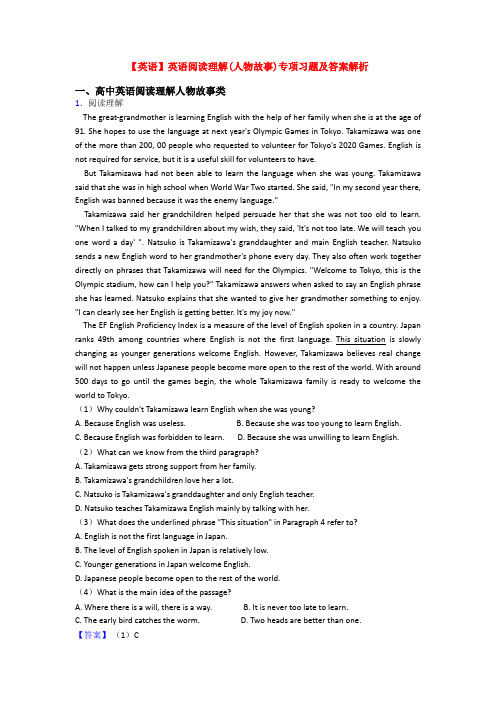
【英语】英语阅读理解(人物故事)专项习题及答案解析一、高中英语阅读理解人物故事类1.阅读理解The great-grandmother is learning English with the help of her family when she is at the age of 91. She hopes to use the language at next year's Olympic Games in Tokyo. Takamizawa was one of the more than 200, 00 people who requested to volunteer for Tokyo's 2020 Games. English is not required for service, but it is a useful skill for volunteers to have.But Takamizawa had not been able to learn the language when she was young. Takamizawa said that she was in high school when World War Two started. She said, "In my second year there, English was banned because it was the enemy language."Takamizawa said her grandchildren helped persuade her that she was not too old to learn. "When I talked to my grandchildren about my wish, they said, 'It's not too late. We will teach you one word a day' ". Natsuko is Takamizawa's granddaughter and main English teacher. Natsuko sends a new English word to her grandmother's phone every day. They also often work together directly on phrases that Takamizawa will need for the Olympics. "Welcome to Tokyo, this is the Olympic stadium, how can I help you?" Takamizawa answers when asked to say an English phrase she has learned. Natsuko explains that she wanted to give her grandmother something to enjoy. "I can clearly see her English is getting better. It's my joy now."The EF English Proficiency Index is a measure of the level of English spoken in a country. Japan ranks 49th among countries where English is not the first language. This situation is slowly changing as younger generations welcome English. However, Takamizawa believes real change will not happen unless Japanese people become more open to the rest of the world. With around 500 days to go until the games begin, the whole Takamizawa family is ready to welcome the world to Tokyo.(1)Why couldn't Takamizawa learn English when she was young?A. Because English was useless.B. Because she was too young to learn English.C. Because English was forbidden to learn.D. Because she was unwilling to learn English.(2)What can we know from the third paragraph?A. Takamizawa gets strong support from her family.B. Takamizawa's grandchildren love her a lot.C. Natsuko is Takamizawa's granddaughter and only English teacher.D. Natsuko teaches Takamizawa English mainly by talking with her.(3)What does the underlined phrase "This situation" in Paragraph 4 refer to?A. English is not the first language in Japan.B. The level of English spoken in Japan is relatively low.C. Younger generations in Japan welcome English.D. Japanese people become open to the rest of the world.(4)What is the main idea of the passage?A. Where there is a will, there is a way.B. It is never too late to learn.C. The early bird catches the worm.D. Two heads are better than one.【答案】(1)C(2)A(3)B(4)B【解析】【分析】本文是一篇记叙文,日本91岁的奶奶Takamizawa为了做好迎接在东京举行的2020奥运会的志愿工作,在孙辈的鼓励和帮助下开始学习英语。
对麦琪和迪伊人物形象的分析
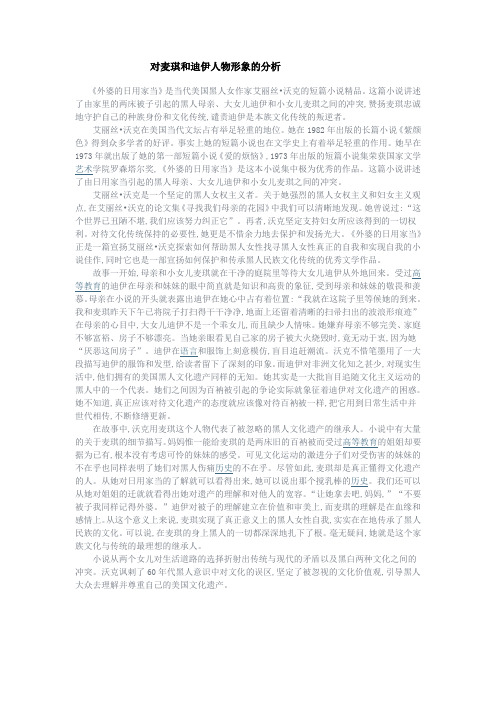
对麦琪和迪伊人物形象的分析《外婆的日用家当》是当代美国黑人女作家艾丽丝•沃克的短篇小说精品。
这篇小说讲述了由家里的两床被子引起的黑人母亲、大女儿迪伊和小女儿麦琪之间的冲突,赞扬麦琪忠诚地守护自己的种族身份和文化传统,谴责迪伊是本族文化传统的叛逆者。
艾丽丝•沃克在美国当代文坛占有举足轻重的地位。
她在1982年出版的长篇小说《紫颜色》得到众多学者的好评。
事实上她的短篇小说也在文学史上有着举足轻重的作用。
她早在1973年就出版了她的第一部短篇小说《爱的烦恼》,1973年出版的短篇小说集荣获国家文学艺术学院罗森塔尔奖,《外婆的日用家当》是这本小说集中极为优秀的作品。
这篇小说讲述了由日用家当引起的黑人母亲、大女儿迪伊和小女儿麦琪之间的冲突。
艾丽丝•沃克是一个坚定的黑人女权主义者。
关于她强烈的黑人女权主义和妇女主义观点,在艾丽丝•沃克的论文集《寻找我们母亲的花园》中我们可以清晰地发现。
她曾说过:“这个世界已丑陋不堪,我们应该努力纠正它”。
再者,沃克坚定支持妇女所应该得到的一切权利。
对待文化传统保持的必要性,她更是不惜余力地去保护和发扬光大。
《外婆的日用家当》正是一篇宣扬艾丽丝•沃克探索如何帮助黑人女性找寻黑人女性真正的自我和实现自我的小说佳作,同时它也是一部宣扬如何保护和传承黑人民族文化传统的优秀文学作品。
故事一开始,母亲和小女儿麦琪就在干净的庭院里等待大女儿迪伊从外地回来。
受过高等教育的迪伊在母亲和妹妹的眼中简直就是知识和高贵的象征,受到母亲和妹妹的敬畏和羡慕。
母亲在小说的开头就表露出迪伊在她心中占有着位置:“我就在这院子里等候她的到来。
我和麦琪昨天下午已将院子打扫得干干净净,地面上还留着清晰的扫帚扫出的波浪形痕迹”在母亲的心目中,大女儿迪伊不是一个乖女儿,而且缺少人情味。
她嫌弃母亲不够完美、家庭不够富裕、房子不够漂亮。
当她亲眼看见自己家的房子被大火烧毁时,竟无动于衷,因为她“厌恶这间房子”。
迪伊在语言和服饰上刻意模仿,盲目追赶潮流。
《外婆日用家当》中人物分析
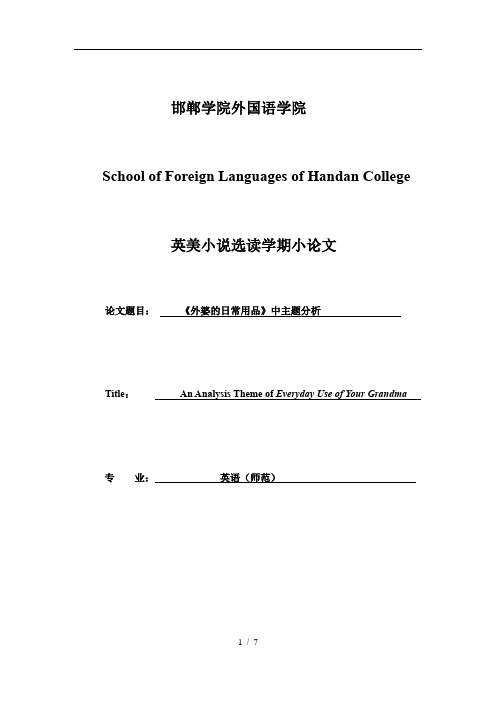
邯郸学院外国语学院School of Foreign Languages of Handan College 英美小说选读学期小论文论文题目:《外婆的日常用品》中主题分析Title:An Analysis Theme of Everyday Use of Your Grandma 专业:英语(师范)_An Analysis Theme of Everyday Use of Your GrandmaAbstract: Alice Walker, the first black woman winner of Pulitzer Prize for Literature, was born in 1944 in Eatonton, Georgia, best known as the author of The Color Purple. In the 1960s, Walker actively participates in the activities of humanism for the black, struggling for the equality of the race. Her works are known for their portrayals of the African American’s life. She depicts vividly the sexism, racism and poverty that make the life often a struggle. In Everyday Use, the author has successfully shaped the representatives of traditional culture. Through describes the mother and daughters as representatives of modern image to express the characters how to understand and inherit ancestral quilt begin plot, reflecting the racial issue arising from family conflicts, and expressing important themes: the significance of tradition culture of traditions inherited a deep understanding of their cultural content, rather than floating on the surface, a mere formality.Key words: tradition heritage educationIntroductionIn Everyday Use, Alice Walker argues that an African-American is both African and American, and denies the American side of one's heritage is disrespectful of one's ancestors and consequently harmful to one's self. Alice Walker is the eighth child of sharecropper parents, and grows up in the midst of violent racism and poverty, which influences her later writings. She uses the principal characters of Mama, Dee(Wangero) and Maggie to clarify the themes. Everyday setting around the year 1970 is a story about a poor black mother and her two daughters and Maggie. Dee, the elder daughter, goes to a college in the north, and visits her home one day and brings her boyfriend. The other daughter, Maggie, still lives with her mother. Maggie is slow, disfigured and simple-minded in contrast to Dee, who is clever, beautiful but arrogant type of woman. For the quilt, the mother has left for Maggie as wedding present. She refuses to give Dee the quilt to hang it in the room because she cannot fully understand the value of the heritage. By discussing the cultural and historical context of the story and through detailed reviewing of the content, the thesis tries to deeply analyze the theme of Alice Walker's Everyday Use, and it shows that the writer wants to tell readers two mistakes in Afro-Americans' cultural identification: escaping from the painful history and blind seeking for African culture. 1. The Meaning of HeritageAfrican American cultural identity has always been with special complexity. It contains the African culture that has been nearly forgotten because of distant time and space and the painful culture that came into being under the White’s racist behavior towards the black, like oppression, discrimination and segregation. To the painful history, most Afro-American wouldn’t like to face or accept bravely, while to the African culture, they would not thoroughly understand due to far distance, so they would probably become blind when they try to trace back to their original culture. In the novel, Dee, angered by what she views as a history of oppression in her family, has constructed a new heritage for herself and rejected her real heritage. She fails to see the family legacy of her given name and takes on a new name, Wangero, which she believes more accurately represents her African heritage. However, the new name, like the “African” clothes and jewelry she wears to make a statement, is meaningless. She has little true understanding ofAfrica, so what she considers her true heritage is actually empty and false. Furthermore, Dee views her real heritage as dead, something of the past, rather than as a living, ongoing creation. She desires the carved dasher and family quilts, but she sees them as artifacts of a lost time, suitable for display but not for actual, practical use. She has set herself outside her own history, rejecting her real heritage in favor of a constructed one.Mama and Dee have very different ideas about what “heritage” is, and for Mama, the family objects are infused with the presence of the people who made and used them. The family heirlooms are the true tokens of Dee’s identity and origins, but Dee knows little about the past. She misstates the essential facts about how the quilts were made and what fabrics were used to make them, even though she pretends to be deeply connected to this folk tradition. Her desire to hang the quilts in a museum suggests that she feels reverence for them but that to her they are essentially foreign, impersonal objects. Mama understands that Maggie, not Dee, should have the quilts, because Maggie will respect them by using them in the way they are intended to be used. When Dee contends at the end of the story that Mama and Maggie do not understand their heritage, Walker intends the remark to be ironic: it is Dee who does not understand her heritage.2. The Divisive Power of EducationAlthough Mama struggles to send Dee to a good school, whereas, the education proves to be more divisive than beneficial to Dee’s relationship with her family. Mama herself was denied an education. When she was a child, her school was closed, and no one attempted to try to reopen it. Racism, passive acceptance, and forces beyond her control set Mama on the road that led to her life of toil. Dee was fortunate that Mama gave her the opportunity for advantages and refinements, but they have served only to create a wedge between Dee and the rest of the family. Dee uses her intellect to intimidate others, greeting her mother with “Wa-su-zo Tean-o,” a greeting in an obscure African language Mama most likely does not speak. Dee, with her knowledge and worldliness, is a threat to the simple world Mama and Maggie inhabit, and Dee seems determined to lord her knowledge over them. Even as a child, Dee reads to her mother and sister “without pity”, “forcing” strange ideas on them and unsettling their simple domestic contentment.Education has separated Dee from her family, but it has also separated Dee from a true sense of herself. With lofty ideals and educational opportunity come a loss of a sense of heritage, background, and identity, which only family can provide. Dee arrives at the family home as a strange, threatening ambassador of a new world, a world that has left Maggie and Mama behind. Civil rights, greater visibility and zero tolerance for inequality are characteristics of Dee’s world. These things are not, in and of themselves, problematic. What is problematic is that Dee has no respect for anything but her world, leading her to alienate herself from her roots. Maggie, on the other hand, knows no world but the one she came from. Uneducated, she can read only haltingly. By doing what she is told and accepting the conditions of her sheltered life without question, Maggie has hampered her own self-fulfillment. Walker sets up this contrast to reveal an ironic contradiction: Dee’s voracious quest for knowledge has led to her alienation from her family, while the lack of education has harmed and stifled Maggie. Both education and the lack of it have proven to be dangerous for the sisters.3. The Inequality of FamilyThroughout the story, there exists a sense of inequality. Mama, Dee and Maggie cannot communicate in a equal environment. For example, the absence of eye contact and strong eyesight reveals the difficulty that Mama, Dee, and Maggie have in relating to one another. Mama is unable to look a white person in the eye, suggesting that she has never managed to embrace the idea of equality, whereas Dee can do so easily. Maggie cannot look anyone in the eye at all, hanging her head as she walks, portraying herself as a silent victim. In describing Maggie’s ability to read, Mama says that Maggie does the best she can despite not being able to see well. This qualified vision is associated with a lack of intelligence, equaliterianism or mental acuity. Walker describes Dee as wide-eyed, always taking in the world around her. During the house fire that happened when she was a child, the flames transfixed her, consuming the home represented ignorance and poverty to her. Mama claims Dee’s attention was often so rapt that she would not blink for long stretches of time. Dee’s easy eye contact and intense gazes reveal her critical, condescending nature. Soon after arriving at the family home, Dee and Hakim send “eye signals” to each other, silently registering their disdain for Mama and Maggie’s simple, rusticworld. In addition, Dee’s renaming—is a way of connecting to the past and an indication of the fluid nature of identity. Walker does not tell us the origins of Maggie’s name, and Mama’s name is never given, but we know that these two characters are unchanging and have strong ties to their heritage. It therefore makes sense that their names and identities are stable and unremarkable. Dee, on the other hand, attempts to transform herself and embrace what she considers her true heritage by adopting an African name. Her boyfriend, Hakim-a-barber, may have taken on his name for similar reasons, as he grew to embrace Muslim ideas. That is to say, Dee believes renaming is a sign that she can take on a new identity. To some degree, Dee does not think that she and her sister are equal in the family and using the name to express she has a different status to her sister. Dee believes that the name Wangero holds more power and significance than Dee, the name passed down through four generations. Dee’s belief that she is named after her oppressors shows a critical lack of understanding. Quick to judgment, she sees her given name as an emblem of a racist, abusive world, as opposed to a tribute to a long line of strong women. Dee’s decision to take on a new name highlights the confused views she has of her own heritage.All the above, they shows there is no equality between the family members.ConclusionAlice Walker expresses the struggles of blacks, particularly woman, and their lives in a racist, sexist, and violent society. Her writings also focus on the role of woman of color and history. Walker is a respected figure in the liberal political community for her support of unconventional and unpopular views as a matter of principle. In Everyday Use, the author has successfully expresses her ideas of traditional culture. The story is widely accepted as one of the best stories on the dilemma of black heritage and has a wide range of images. For most of readers, every time it gives birth to new aspects for they have understood one of the numerous levels of meaning the story includes. After discussing the themes of the story, readers can have a comprehensive understanding about the story Everyday Use for Your Grandma.BibliographyHeol, Hegla. “Personal Names and Heritage in Alice Walker’s Everyday Use”[J]. American Studies in Scandinavia, 1991(1)Walker, Alice. In Love and Trouble: Stories of Black Women [M]. Harcourt Brace &Company, 1973Sperber, Wilson. Relevance: Communication and Cognition[M]. New York: Cambridge University Press, 1986黄炳瑜. 女性自我意识的觉醒——爱丽丝·沃克《日常使用》中的女性形象, 广西师范学院院报: 哲学社会科学版[J], 2003(1)季静芬. 爱丽丝·沃克的感叹——试析《奶奶的日用家当》的思想内涵[J]. 常熟高专学报, 1999(3)谢玉娥. 《女性文学研究》[M]. 河南: 河南大学出版社, 1996张汉熙. 高级英语(修订本)[M]. 北京: 外语教育与研究出版社, 1996第二版张德明. 多元文化杂交时代的民族文化记忆问题[J]. 外国文学评论, 2001(3)[文档可能无法思考全面,请浏览后下载,另外祝您生活愉快,工作顺利,万事如意!]。
mygrandmotherthebaglady读后感
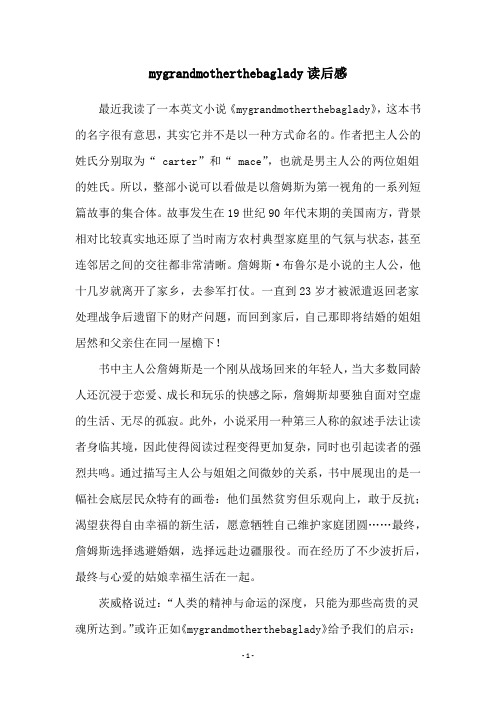
mygrandmotherthebaglady读后感最近我读了一本英文小说《mygrandmotherthebaglady》,这本书的名字很有意思,其实它并不是以一种方式命名的。
作者把主人公的姓氏分别取为“ carter”和“ mace”,也就是男主人公的两位姐姐的姓氏。
所以,整部小说可以看做是以詹姆斯为第一视角的一系列短篇故事的集合体。
故事发生在19世纪90年代末期的美国南方,背景相对比较真实地还原了当时南方农村典型家庭里的气氛与状态,甚至连邻居之间的交往都非常清晰。
詹姆斯·布鲁尔是小说的主人公,他十几岁就离开了家乡,去参军打仗。
一直到23岁才被派遣返回老家处理战争后遗留下的财产问题,而回到家后,自己那即将结婚的姐姐居然和父亲住在同一屋檐下!书中主人公詹姆斯是一个刚从战场回来的年轻人,当大多数同龄人还沉浸于恋爱、成长和玩乐的快感之际,詹姆斯却要独自面对空虚的生活、无尽的孤寂。
此外,小说采用一种第三人称的叙述手法让读者身临其境,因此使得阅读过程变得更加复杂,同时也引起读者的强烈共鸣。
通过描写主人公与姐姐之间微妙的关系,书中展现出的是一幅社会底层民众特有的画卷:他们虽然贫穷但乐观向上,敢于反抗;渴望获得自由幸福的新生活,愿意牺牲自己维护家庭团圆……最终,詹姆斯选择逃避婚姻,选择远赴边疆服役。
而在经历了不少波折后,最终与心爱的姑娘幸福生活在一起。
茨威格说过:“人类的精神与命运的深度,只能为那些高贵的灵魂所达到。
”或许正如《mygrandmotherthebaglady》给予我们的启示:一个人无论在怎样恶劣的环境下都应该保持着积极乐观的态度。
就像主人公詹姆斯的母亲伊丽莎白,她一直告诫儿子和女儿要知足常乐。
这或许也暗含了人性的真谛——对未来充满希望,永远相信明天会更好。
但假若太贪婪地追求更好的东西而忘记了珍惜眼前的拥有,那么失去的时候也便是万劫不复的时刻。
所谓的幸福快乐也只是一种想象罢了。
崧本书适合学生、初高中生及大学生等各阶段的人群。
高考英语阅读理解(人物故事)易错剖析含解析
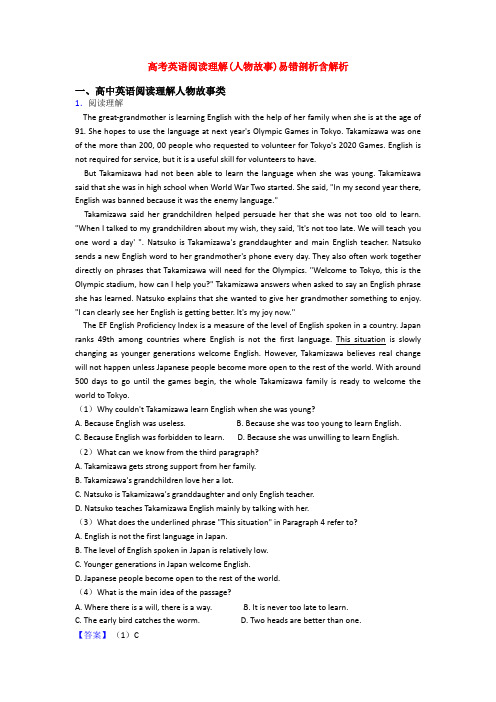
高考英语阅读理解(人物故事)易错剖析含解析一、高中英语阅读理解人物故事类1.阅读理解The great-grandmother is learning English with the help of her family when she is at the age of 91. She hopes to use the language at next year's Olympic Games in Tokyo. Takamizawa was one of the more than 200, 00 people who requested to volunteer for Tokyo's 2020 Games. English is not required for service, but it is a useful skill for volunteers to have.But Takamizawa had not been able to learn the language when she was young. Takamizawa said that she was in high school when World War Two started. She said, "In my second year there, English was banned because it was the enemy language."Takamizawa said her grandchildren helped persuade her that she was not too old to learn. "When I talked to my grandchildren about my wish, they said, 'It's not too late. We will teach you one word a day' ". Natsuko is Takamizawa's granddaughter and main English teacher. Natsuko sends a new English word to her grandmother's phone every day. They also often work together directly on phrases that Takamizawa will need for the Olympics. "Welcome to Tokyo, this is the Olympic stadium, how can I help you?" Takamizawa answers when asked to say an English phrase she has learned. Natsuko explains that she wanted to give her grandmother something to enjoy. "I can clearly see her English is getting better. It's my joy now."The EF English Proficiency Index is a measure of the level of English spoken in a country. Japan ranks 49th among countries where English is not the first language. This situation is slowly changing as younger generations welcome English. However, Takamizawa believes real change will not happen unless Japanese people become more open to the rest of the world. With around 500 days to go until the games begin, the whole Takamizawa family is ready to welcome the world to Tokyo.(1)Why couldn't Takamizawa learn English when she was young?A. Because English was useless.B. Because she was too young to learn English.C. Because English was forbidden to learn.D. Because she was unwilling to learn English.(2)What can we know from the third paragraph?A. Takamizawa gets strong support from her family.B. Takamizawa's grandchildren love her a lot.C. Natsuko is Takamizawa's granddaughter and only English teacher.D. Natsuko teaches Takamizawa English mainly by talking with her.(3)What does the underlined phrase "This situation" in Paragraph 4 refer to?A. English is not the first language in Japan.B. The level of English spoken in Japan is relatively low.C. Younger generations in Japan welcome English.D. Japanese people become open to the rest of the world.(4)What is the main idea of the passage?A. Where there is a will, there is a way.B. It is never too late to learn.C. The early bird catches the worm.D. Two heads are better than one.【答案】(1)C(2)A(3)B(4)B【解析】【分析】本文是一篇记叙文,日本91岁的奶奶Takamizawa为了做好迎接在东京举行的2020奥运会的志愿工作,在孙辈的鼓励和帮助下开始学习英语。
最新高考英语阅读理解(人物故事)抓分精品训练含解析
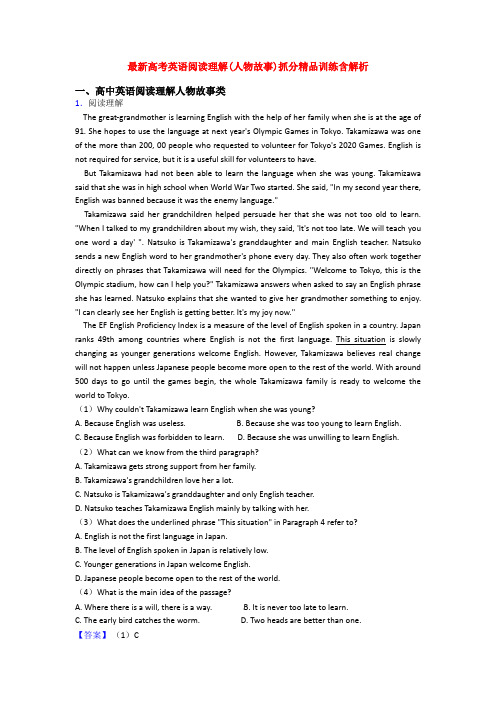
最新高考英语阅读理解(人物故事)抓分精品训练含解析一、高中英语阅读理解人物故事类1.阅读理解The great-grandmother is learning English with the help of her family when she is at the age of 91. She hopes to use the language at next year's Olympic Games in Tokyo. Takamizawa was one of the more than 200, 00 people who requested to volunteer for Tokyo's 2020 Games. English is not required for service, but it is a useful skill for volunteers to have.But Takamizawa had not been able to learn the language when she was young. Takamizawa said that she was in high school when World War Two started. She said, "In my second year there, English was banned because it was the enemy language."Takamizawa said her grandchildren helped persuade her that she was not too old to learn. "When I talked to my grandchildren about my wish, they said, 'It's not too late. We will teach you one word a day' ". Natsuko is Takamizawa's granddaughter and main English teacher. Natsuko sends a new English word to her grandmother's phone every day. They also often work together directly on phrases that Takamizawa will need for the Olympics. "Welcome to Tokyo, this is the Olympic stadium, how can I help you?" Takamizawa answers when asked to say an English phrase she has learned. Natsuko explains that she wanted to give her grandmother something to enjoy. "I can clearly see her English is getting better. It's my joy now."The EF English Proficiency Index is a measure of the level of English spoken in a country. Japan ranks 49th among countries where English is not the first language. This situation is slowly changing as younger generations welcome English. However, Takamizawa believes real change will not happen unless Japanese people become more open to the rest of the world. With around 500 days to go until the games begin, the whole Takamizawa family is ready to welcome the world to Tokyo.(1)Why couldn't Takamizawa learn English when she was young?A. Because English was useless.B. Because she was too young to learn English.C. Because English was forbidden to learn.D. Because she was unwilling to learn English.(2)What can we know from the third paragraph?A. Takamizawa gets strong support from her family.B. Takamizawa's grandchildren love her a lot.C. Natsuko is Takamizawa's granddaughter and only English teacher.D. Natsuko teaches Takamizawa English mainly by talking with her.(3)What does the underlined phrase "This situation" in Paragraph 4 refer to?A. English is not the first language in Japan.B. The level of English spoken in Japan is relatively low.C. Younger generations in Japan welcome English.D. Japanese people become open to the rest of the world.(4)What is the main idea of the passage?A. Where there is a will, there is a way.B. It is never too late to learn.C. The early bird catches the worm.D. Two heads are better than one.【答案】(1)C(2)A(3)B(4)B【解析】【分析】本文是一篇记叙文,日本91岁的奶奶Takamizawa为了做好迎接在东京举行的2020奥运会的志愿工作,在孙辈的鼓励和帮助下开始学习英语。
高三英语阅读理解(人物故事)提高训练含解析
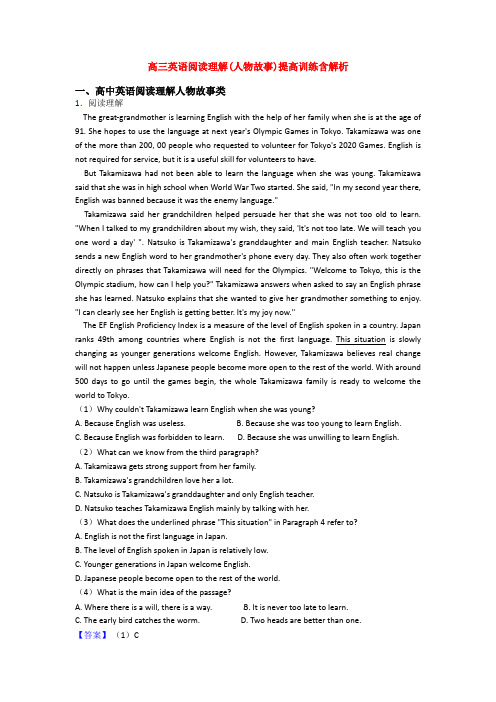
高三英语阅读理解(人物故事)提高训练含解析一、高中英语阅读理解人物故事类1.阅读理解The great-grandmother is learning English with the help of her family when she is at the age of 91. She hopes to use the language at next year's Olympic Games in Tokyo. Takamizawa was one of the more than 200, 00 people who requested to volunteer for Tokyo's 2020 Games. English is not required for service, but it is a useful skill for volunteers to have.But Takamizawa had not been able to learn the language when she was young. Takamizawa said that she was in high school when World War Two started. She said, "In my second year there, English was banned because it was the enemy language."Takamizawa said her grandchildren helped persuade her that she was not too old to learn. "When I talked to my grandchildren about my wish, they said, 'It's not too late. We will teach you one word a day' ". Natsuko is Takamizawa's granddaughter and main English teacher. Natsuko sends a new English word to her grandmother's phone every day. They also often work together directly on phrases that Takamizawa will need for the Olympics. "Welcome to Tokyo, this is the Olympic stadium, how can I help you?" Takamizawa answers when asked to say an English phrase she has learned. Natsuko explains that she wanted to give her grandmother something to enjoy. "I can clearly see her English is getting better. It's my joy now."The EF English Proficiency Index is a measure of the level of English spoken in a country. Japan ranks 49th among countries where English is not the first language. This situation is slowly changing as younger generations welcome English. However, Takamizawa believes real change will not happen unless Japanese people become more open to the rest of the world. With around 500 days to go until the games begin, the whole Takamizawa family is ready to welcome the world to Tokyo.(1)Why couldn't Takamizawa learn English when she was young?A. Because English was useless.B. Because she was too young to learn English.C. Because English was forbidden to learn.D. Because she was unwilling to learn English.(2)What can we know from the third paragraph?A. Takamizawa gets strong support from her family.B. Takamizawa's grandchildren love her a lot.C. Natsuko is Takamizawa's granddaughter and only English teacher.D. Natsuko teaches Takamizawa English mainly by talking with her.(3)What does the underlined phrase "This situation" in Paragraph 4 refer to?A. English is not the first language in Japan.B. The level of English spoken in Japan is relatively low.C. Younger generations in Japan welcome English.D. Japanese people become open to the rest of the world.(4)What is the main idea of the passage?A. Where there is a will, there is a way.B. It is never too late to learn.C. The early bird catches the worm.D. Two heads are better than one.【答案】(1)C(2)A(3)B(4)B【解析】【分析】本文是一篇记叙文,日本91岁的奶奶Takamizawa为了做好迎接在东京举行的2020奥运会的志愿工作,在孙辈的鼓励和帮助下开始学习英语。
Unit7TheMonster课文翻译综合教程四

Unit 7The Monst erDeems Taylor1He was an un dersized littleman, with a head too big for his body ― a sickly little man. His nerves were bad. He had skin tr ouble. It was ag ony for him to w ear anything nex t to his skin co arser than silk. And he had delu sions of grandeu r.2He was amonster of conce it. Never for on e minute did helook at the worl d or at people,except in relati on to himself. H e believed himse lf to be one ofthe greatest dra matists in the w orld, one of the greatest thinke rs, and one of t he greatest comp osers. To hear h im talk, he wasShakespeare, and Beethoven, andPlato, rolled in to one. He was o ne of the most e xhausting conver sationalists tha t ever lived.So metimes he was b rilliant; someti mes he was madde ningly tiresome. But whether hewas being brilli ant or dull, hehad one sole top ic of conversati on: himself. Wha t he thought and what he did.3He had a mania for being in th e right. The sli ghtest hint of d isagreement, fro m anyone, on the most trivial po int, was enoughto set him off o n a harangue tha t might last for hours, in which he proved himse lf right in so m any ways, and wi th such exhausti ng volubility, t hat in the end h is hearer, stunn ed and deafened, would agree wit h him, for the s ake of peace.4It never occur red to him thathe and his doing were not of the most intense an d fascinating in terest to anyone with whom he ca me in contact. H e had theories a bout almost anysubject under th e sun, including vegetarianism,the drama, polit ics, and music;and in support o f these theories he wrote pamphl ets, letters, bo oks ...thousand s upon thousands of words, hundr eds and hundreds of pages. He no t only wrote the se things, and p ublish ed them ―usually at someb ody else’s expen se ― but he woul d sit and read t hem aloud, for h ours, to his fri ends, and his fa mily.5He had the emotional s tability of a si x-year-old child. When he felt o ut of sorts, hewould rave and s tamp, or sink in to suicidal gloo m and talk darkl y of going to th e East to end hi s days as a Budd hist monk. Ten m inutes later, wh en something ple ased him he woul d rush out of do ors and run arou nd the garden, o r jump up and do wn off the sofa, or stand on his head. He couldbe grief-stricke n over the death ofa pet dog, a nd could be call ous and heartles s to a degree th at would have ma de aRoman emper or shudder.6He was almost in nocent of any se nse of responsib ility. He was co nvinced that theworld owed hima living. In sup port of this bel ief, he borrowed money from ever ybody who was go od for a loan ―men, women, frie nds, or stranger s. He wrote begg ing letters by t he score, someti mes groveling wi thout shame, atothers loftily o ffering his inte nded benefactorthe privilege of contributing to his support, an d being mortally offended if the recipient decli ned the honor.7What money he could lay his h and on he spentlike an Indian r ajah. No one wil l ever know ― ce rtainly he never knows ― how muc h money he owed. We do know that his greatest be nefactor gave hi m $6,000 to paythe most pressin g of his debts i n one city, anda year later had to give him $16,000 to enable h im to live in an other city witho ut being throwninto jail for de bt.8He was e qually unscrupul ous in other way s. An endless pr ocession of wome n marched throug h his life. Hisfirst wife spent twenty years en during and forgi ving his infidel ities. His secon d wife had beenthe wife of hismost devoted fri end and admirer, from whom he st ole her. And eve n while he was t rying to persuad e her to leave h er first husband he was writingto a friend to i nquire whether h e could suggestsome wealthy wom an ― any wealt hy woman ― whom he could marry for her money.9He had a geniusfor making enemi es. He would ins ult a man who di sagreed with him about the weath er. He would pul l endless wiresin order to meet some man who ad mired his work a nd was able andanxious to be of use to him ― an d would proceedto make a mortal enemy of him wi th some idioticand wholly uncal led-for exhibiti on of arroganceand bad manners. A character inone of his opera s was a caricatu re of one of the most powerful m usic critics ofhis day. Not con tent with burles quing him, he in vited the critic to his house an d read him the l ibretto aloud in front of his fr iends.10The n ame of this mons ter was RichardWagner. Everythi ng I have said a bout him you can find on record― in newspapers, in police repor ts, in the testi mony of people w ho knew him, inhis own letters, between the lin es of his autobi ography.And the curious thing a bout this record is that it does n’t matter in th e least.11Bec ause this unders ized, sickly, di sagreeable, fasc inating little m an was right all the time, the j oke was on us. H e was one of the world’s greates t dramatists; he was a great thi nker; he was one of the most stu pendous musicalgeniuses that, u p to now, the wo rld has ever see n. The world did owe him a livin g. What if he di d talk about him self all the tim e? If he talkedabout himself fo r twenty-four ho urs every day fo r the span of hi s life he wouldnot have uttered half the number of words that o thermen have sp oken and written about him since his death.12When you conside r what he wrote― thirteen opera s and music dram as, eleven of th em still holding the stage, eigh t of them unques tionably worth r anking among the wor ld’s great m usico-dramatic m asterpieces ― wh en you listen to what he wrote,the debts and he artaches that pe ople had to endu re from him don’t seem much of a price.13W hat if he was fa ithless to his f riends and to hi s wives? He hadone mistress towhom he was fait hful to the dayof his death: Mu sic. Not for a s ingle moment did he ever comprom ise with what he believed, withwhat he dreamed. There is not aline of his musi c that could hav e been conceived by a little min d. Even when heis dull, or down right bad, he is dull in the gra nd manner. Liste ning to his musi c, one does notforgive him forwhat he may or m ay not have been. It is not a ma tter of forgiven ess. It is a mat ter of being dum b with wonder th at his poor brai n and body didn’t burst under th e torment of the demon of creati ve energy that l ived inside him, struggling, cla wing, scratching to be released; tearing, shriek ing at him to wr ite the music th at was in him. T he miracle is th at what he did i n the little spa ce of seventy ye ars could have b een done at all, even by a great genius. Is it a ny wonder he had no time to be a man?畸人迪姆斯·泰勒1 他是个大头小身体、病怏怏的矬子;成日神经兮兮,皮肤也有毛病。
最新高考英语人物传记类阅读理解
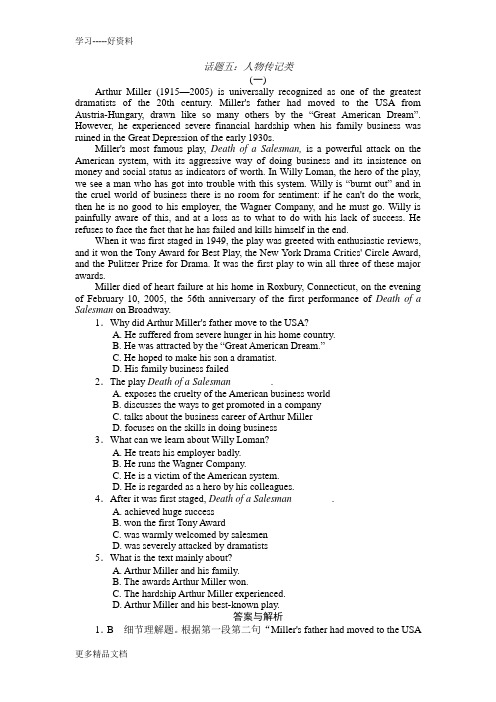
话题五:人物传记类(一)Arthur Miller (1915—2005) is universally recognized as one of the greatest dramatists of the 20th century. Miller's father had moved to the USA from AustriaHungary, drawn like so many others by the “Great American Dream”. However, he experienced severe financial hardship when his family business was ruined in the Great Depression of the early 1930s.Miller's most famous play, Death of a Salesman, is a powerful attack on the American system, with its aggressive way of doing business and its insistence on money and social status as indicators of worth. In Willy Loman, the hero of the play, we see a man who has got into trouble with this system. Willy is “burnt out” and in the cruel world of business there is no room for sentiment: if he can't do the work, then he is no good to his employer, the Wagner Company, and he must go. Willy is painfully aware of this, and at a loss as to what to do with his lack of success. He refuses to face the fact that he has failed and kills himself in the end.When it was first staged in 1949, the play was greeted with enthusiastic reviews, and it won the Tony Award for Best Play, the New York Drama Critics' Circle Award, and the Pulitzer Prize for Drama. It was the first play to win all three of these major awards.Miller died of heart failure at his home in Roxbury, Connecticut, on the evening of February 10, 2005, the 56th anniversary of the first performance of Death of a Salesman on Broadway.1.Why did Arthur Miller's father move to the USA?A. He suffered from severe hunger in his home country.B. He was attracted by the “Great American Dream.”C. He hoped to make his son a dramatist.D. His family business failed2.The play Death of a Salesman________.A. exposes the cruelty of the American business worldB. discusses the ways to get promoted in a companyC. talks about the business career of Arthur MillerD. focuses on the skills in doing business3.What can we learn about Willy Loman?A. He treats his employer badly.B. He runs the Wagner Company.C. He is a victim of the American system.D. He is regarded as a hero by his colleagues.4.After it was first staged, Death of a Salesman________.A. achieved huge successB. won the first Tony AwardC. was warmly welcomed by salesmenD. was severely attacked by dramatists5.What is the text mainly about?A. Arthur Miller and his family.B. The awards Arthur Miller won.C. The hardship Arthur Miller experienced.D. Arthur Miller and his best-known play.答案与解析1.B细节理解题。
外婆的日用家当--伊迪
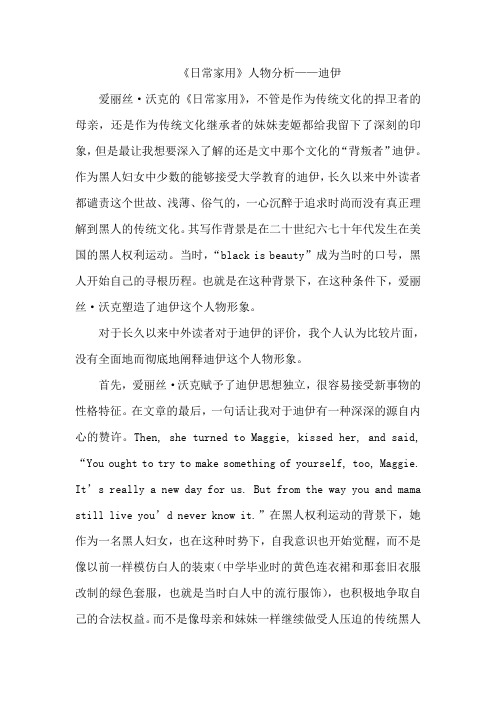
《日常家用》人物分析——迪伊爱丽丝·沃克的《日常家用》,不管是作为传统文化的捍卫者的母亲,还是作为传统文化继承者的妹妹麦姬都给我留下了深刻的印象,但是最让我想要深入了解的还是文中那个文化的“背叛者”迪伊。
作为黑人妇女中少数的能够接受大学教育的迪伊,长久以来中外读者都谴责这个世故、浅薄、俗气的,一心沉醉于追求时尚而没有真正理解到黑人的传统文化。
其写作背景是在二十世纪六七十年代发生在美国的黑人权利运动。
当时,“black is beauty”成为当时的口号,黑人开始自己的寻根历程。
也就是在这种背景下,在这种条件下,爱丽丝·沃克塑造了迪伊这个人物形象。
对于长久以来中外读者对于迪伊的评价,我个人认为比较片面,没有全面地而彻底地阐释迪伊这个人物形象。
首先,爱丽丝·沃克赋予了迪伊思想独立,很容易接受新事物的性格特征。
在文章的最后,一句话让我对于迪伊有一种深深的源自内心的赞许。
Then, she turned to Maggie, kissed her, and said, “You ought to try to make something of yourself, too, Maggie. It’s really a new day for us. But from the way you and mama still live you’d never know it.”在黑人权利运动的背景下,她作为一名黑人妇女,也在这种时势下,自我意识也开始觉醒,而不是像以前一样模仿白人的装束(中学毕业时的黄色连衣裙和那套旧衣服改制的绿色套服,也就是当时白人中的流行服饰),也积极地争取自己的合法权益。
而不是像母亲和妹妹一样继续做受人压迫的传统黑人妇女,固守传统,抱残守缺,不适应日益繁复的当代生活。
在迪伊给妈妈和妹妹读书的时候,我们可以从正面去看待迪伊的这个行为。
接受过大学教育的她,试图通过向母亲河妹妹灌输知识来唤醒她们怠惰的沉睡的自我意识,对于文中对迪伊的理解是从母亲的角度去看的,从这里我们可以看出,母亲内心深处的自卑心理,女儿给她们读书,她只看到了女儿似乎瞧不起她们的那一方面,而没有看到女儿也许想要用自己所学的知识来唤醒她和Maggie的思想意识。
